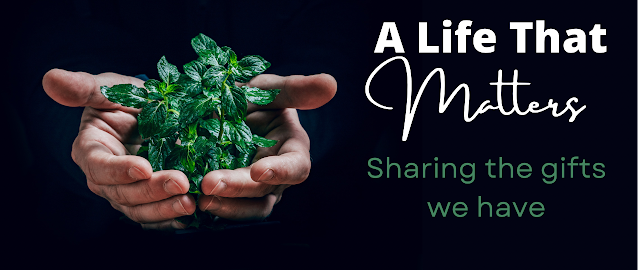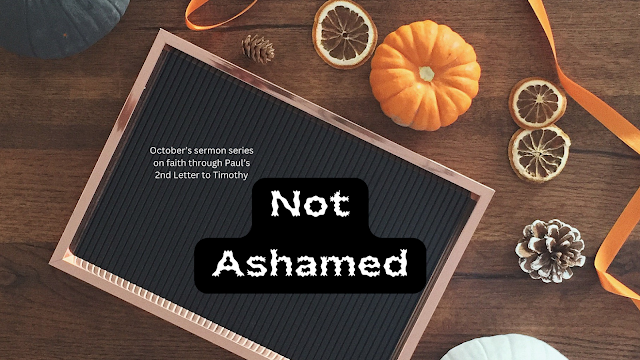The Blessing of Home: Luke 1:39-55 (Advent 4C)
The blessing of home. We've been looking at home through different lenses the last four weeks, and Christmas is so close, I think most of us can even taste it now. What are your favorite flavors of the Christmas season? Mine are of pie - my grandma was a world-class baker. Every holiday - not just Christmas - there would always be four or five pies made, with the flavors rotating, depending on the time of year. Christmas would be apple, pecan (my grandpa's favorite), pumpkin, and mincemeat. As a kid, you hear mincemeat, and you kind of turn up your nose. I don't think I ever tried it while I had it available. It just... doesn't sound appealing. But your nose knows when there is a blessing of home.
The scripture today turns back the clock a little bit - we are reading now out of Luke, chapter 1. Our last couple of weeks we've been focusing on John the Baptist, and this week is no exception, but he's only a side character in our narrative today, since he's in utero. His mother, Elizabeth, and Jesus' mother, Mary, are the main event. You might notice in the text that John's father was mentioned, only because it was at his house that the two women met. Was Zechariah there? Did he have anything to say about it? Maybe. But getting context really matters, because Zechariah was made mute by the Holy Spirit until his son was born. So he was there with the two women rejoicing - saying NOTHING. Now, this week is all about our heroines.
Isn't that enough to start a revolution? The scene is something out of a Hallmark movie itself. Two women, at the bottom of the social ladder for different reasons, much like our story last week - are not high priests, or kings, or emporers. It's Elizabeth WHO? and Mary from WHERE? I mean - think about it.
But the story starts with Mary, who, in the previous ten or eleven verses had just been told by the angel Gabriel that she was with child, and as much as we want to portray her as meek and mild, has the faith to jump into this calling right away. Unlike someone I know... Anyway - She responds to her calling with - I am the Lord's servant, and I will do what the Lord wants, in verse 38, may everything you said come true. Wow... let's take a minute there to admire Mary's depth of faith and instinct in trusting God.
So, here were two unlikely mothers, bonding over this shared experience of being pregnant together, one was too old to bear children, the other too young. This is a wonderful vision of companionship - like Naomi and Ruth. They are offering support to one another in a difficult time. It's difficult being pregnant... I hear. Let's contrast these women though: Elizabeth is from the line of Aaron, which is an older line, Aaron being the brother of Moses. Elizabeth is described in the first section of chapter 1, as righteous, and also is married to a priest. Mary on the other hand, has no ancestral line worth mentioning, not described as blameless or of good character, lives in Nazareth - can anything good come from there? (reference to John 1:45), and Mary's pregnancy lowers her social status, if not kill her, because of laws of Deuteronomy. Elizabeth's pregnancy raises her social status - removes the mark of disgrace since she had been considered barren.
Both Mary and Elizabeth recognize their blessings - how do you respond when God's grace is revealed to you?
I'll let you think about that one. When grace has been revealed to me, I take it with humility, and in a moment of quiet reflection. When bringing up grace though, we could start to think about John Wesley's ideas of grace, that there is prevenient grace, grace that goes before, leading us to God. I think this is maybe what happened to Mary. Scripture says at the beginning of the excerpt that She went "with haste" to Judea - she RAN there. PREGNANT. Who knows on whether it was out of fear, or joy, or confusion, but she wanted to get to Elizabeth quickly. But she knew she needed community. She needed someone to commiserate with. Maybe she wanted to hear Elizabeth's stories of what it was like so she could prepare for what was to come. Yet, Mary wanted someone who would believe and trust in the fantastic story the angel had shared with her, and maybe she felt like Elizabeth is the only one to understand these strange times for them.
Elizabeth, despite not being given a title, is"filled with the Holy Spirit" and is one of the first to be said to do so. As a prophetess, she praises Mary for her faith and devotion. But notice, the blessing isn't just to Mary - Elizabeth has received a blessing in the form of her child as wll! All will be made new because of each of the births. Elizabeth, though is somehow prepared for Mary's arrival. Once Mary arrives, her baby jumps at the arrival.
The response by Mary to Elizabeth's blessing is amazing. The second section of our passage today is Mary's Song, or Magnificat (as is the first word in Latin). Before we get too far, I know it's been a meme going around, but I've had "Mary, Did You Know?" stuck in my head for far too long now, and here is your answer: yes. Mary did know. This whole song is about how she knew that her child will be the answer of prayers from the people of Israel for generations, or she knew that her baby boy would walk on water, that he would be filled with miracles and hope.
Here she is, basking in the fulfillment of God's promises, through her. that her spirit is rejoicing that the world will be turned upside down and that the servants shall be blessed, mercy, strength, and bringing down power structures. This is a very subversive text, and I'm sure there's much more I could go into it, with its provocation and grandeur. But this morning I’d like to stay with the main text - the visit between Mary & Elizabeth.
Since they are both faithful, they know what God has done in the past, having studied the scriptures, and they see where God is working in the present through the visits from the angels and the miraculous pregnancies, and hopeful of what God is going to do in the future. They have nine months to ponder what their new baby of hope will become… and that’s another miracle unto itself. Babies are such wondrous creatures, so full of possibility.
How is love more of a commitment to others than an emotion that comes and goes? Love is more than an emotion. Love is establishing a relationship, leaning into that relationship and seeing the humanity of the person you are loving. When you love someone, it shows that the value to you is in the relationship, and that’s more important than who they are, what they can do for you, or even the substance of how the relationship got started. If you love as an emotion, which is fickle and volatile, then it cannot be unconditional and commital.
How does Jesus' birth show God’s loving commitment to us? Jesus’ birth as the Messiah has been prophesied for centuries before this point, and so how amazing it would have been to have lived when the Savior was born. God’s commitment to us, coming down in person, to be human shows that God wants to be among his creation once again, as it was in the beginning; God values his relationship to humanity more than all of the sin we do. He’s looking past our stubbornness and ego, and looking into our hearts.
With the signs of God working in your life, where are you running to? Who are you excited to tell? We have such hard time finding places to do that these days. I know here at church is a good place to share the blessings, and as we all know, we need to get more people in the building. But not just for counting heads, but to be able to share the glory of God’s action in our lives. Now that would be REVOLUTIONARY. God’s kingdom expands when we are all able to participate. God works in mysterious ways for all of us. Sometimes we may not understand how God is working, but maybe we just need to dig a little deeper, ask a few more questions, find the grace.
Two women, delighting in their specific role God has provided them with - to become mothers, in unusual circumstances, can find commonalities that unite them in faith. That faith, which I’m sure was larger than a mustard seed, ended up changing the world. To turn it upside down… but in the ways that are in line with God’s will, lifting up the lowly, bringing down the powerful, filling the hungry, through mercy, not anger or spite.
Remember that. We will be back here in five days, to celebrate the birth of Mary’s child. We may not know why Mary went to Elizabeth, but we are thankful she did. I'm not sure why each of you came this morning to this place, but I appreciate you doing so. If you came to be accepted, just as you are, not as you are expected to be, welcome. You may relate to Elizabeth's question, "And why has this happened to me?" (verse 43), But our story has one more grand birth to come. Stay. You can sit as long as you like with the people around you, or just God, to remember two things, that God is good, and that God keeps promises. AMEN.




Comments
Post a Comment